Greed
Capitalist Cautionary Tale
BlackBerry highlights the role of greed in capitalism through the story of the rise of the BlackBerry smartphone. The film, which transports us to a time when smartphones weren’t omnipresent fixtures in our lives, shows the danger of valuing innovation more than ethics.
Elevation Pictures
BEFORE HE STEPS onstage as Ike Turner in TINA: The Tina Turner Musical, Garrett Turner (no relation) does a simple ritual: He swirls a wooden mallet along the rim of a Tibetan singing bowl. As the sound washes over him, he focuses on himself as Garrett, not Ike the musician and abusive ex-husband of the “Queen of Rock ’n’ Roll.” And he prays.
“Tina found Buddhism on her way to liberation from Ike, and it was something that Ike decried,” Garrett told me a few days after I saw him perform in Atlanta. Embracing something that Ike pushed away helps Garrett become Ike onstage while remaining Garrett within. With eight shows a week for the touring Broadway production, this spiritual practice helps Garrett draw a clear line between himself and the broken man he portrays.

Image via giulio napolitano/Shutterstock.com
Pope Francis is taking direct aim at the wealthy and powerful of the world, saying in his message for Lent that they are often “slaves to sin” who, if they ignore the poor, “will end up condemning themselves and plunging into the eternal abyss of solitude which is hell.”
“The greater their power and wealth, the more this blindness and deception can grow,” the pontiff wrote in his annual Lenten exhortation, which was released on Jan. 26.
The first sign I had a problem was when I came across Candy Chang’s “Confessions” project in 2012. It was an interactive art installment on the Las Vegas strip that invited people to come in and confess their deepest secrets anonymously. Those secrets would then be added to a visual art display. It was engaging, unexpected, relevant, discussion-provoking. It was fun.
I hated it.
More correctly, I loved it; and hated myself for not actively doing something similar. I wondered how to implement a version of this idea among colleagues and in office hallways of my organization at the time; I considered “art-bombing” the streets of my city with thought-provoking questions; I spent several moments over the next several weeks seriously questioning whether I should drop everything to focus on Chang-style installations, because I could, and I liked it, and it would work, so I should be doing it. Nothing else I was currently doing mattered. Not without this one thing more.
Welcome to an exhaustive (and exhausting) self-talk: the fixation on never doing enough. Until very recently, I thought this way almost all the time. Somehow — accidentally, almost imperceptibly — years of nurturing my professional and creative pursuits was nurturing something else, as well. It became nearly impossible for me to see work that I admired and appreciated and to not simultaneously think, “I should be doing that, too.”
Which is, simply put, raging covetousness.
I drive a Prius. I wouldn't exactly say it's a sexy car; the word "practical" comes to mind. It gets good mileage, is safe, and fits our family of four just fine in most cases. It's gotten its share of bings and dents over the years, but it has been a very reliable and low maintenance way to get around town.
Of course, what I really want is a Tesla. My son wants one too. There is a showcase for them in a local storefront, and he begs me to go by for a visit every time we are nearby. Though he is only 10, he already makes a pretty strong case to my wife, explaining how much of the cost of the car will be offset by the savings in gas, and he was elated to find out it was recently rated the safest car on the road.
So far it hasn't worked in our favor. But we keep trying.
This, of course, is not envy; it is simply good old-fashioned greed. The thing I have is sufficient, only until something newer, edgier, shinier comes along (which, in America, is a daily occurrence). Then suddenly, perfectly good car in our driveway has shortcomings and liabilities that were, hereto for, invisible to us.
Envy is different, and I would argue that it actually is worse than greed. While the latter is simply our desire off of its proverbial chain, envy gets personal. It is the easy but unattractive marriage of greed and judgment. Yes, we desire what someone else has, but there is more to it. When we are envious, we gain nearly as much pleasure from the idea of the other person not having the thing we want as we do from the idea of having it ourselves.
Last week Pope Francis spoke out against the cult of money. Here is how Catholic News Service's Carol Glatz summarized his remarks:
Pope Francis called for global financial reform that respects human dignity, helps the poor, promotes the common good and allows states to regulate markets.
"Money has to serve, not to rule," he said in his strongest remarks yet as pope concerning the world's economic and financial crises.
A major reason behind the increase in social and economic woes worldwide "is in our relationship with money and our acceptance of its power over ourselves and our society," he told a group of diplomats May 16.
"We have created new idols" where the "golden calf of old has found a new and heartless image in the cult of money and the dictatorship of an economy which is faceless and lacking any truly humane goal."
IF THEY HAD met, Aaron Swartz and Vernon Bowman probably wouldn't have hit it off. The 26-year-old Brooklyn, N.Y. computer whiz and the 75-year-old Indiana grain farmer might have been from different planets. But they were brothers-in-arms in a historic struggle over the shape of the 21st century economy and culture. Each, in his own way, has challenged the iron, unyielding hegemony of copyright law that increasingly protects permanent, private, for-profit ownership of artistic creations, scholarly research, and the very processes of life itself.
Aaron Swartz won't be around to see the outcome of this struggle.
Swartz was a successful internet innovator who used his wealth and position to promote "free information." In 2008, he wrote a program that was used to liberate thousands of public-domain federal court records from a site that was charging 10 cents per page for their use. More recently he used his access to the M.I.T. computer network to execute a massive robo-download of millions of scholarly articles from the subscription database JSTOR. The idea was to make the scholarship available free.
After he was caught, JSTOR reached a civil settlement with Swartz that included his surrender of the hard drives containing the articles and then treated the case as closed. But federal prosecutors decided to throw the book at Swartz. He was under a felony indictment for computer fraud and facing a possible 35-year prison sentence. Finally, in January, Swartz, who had a history of depression, killed himself. His parents blamed overzealous prosecutors for his death.
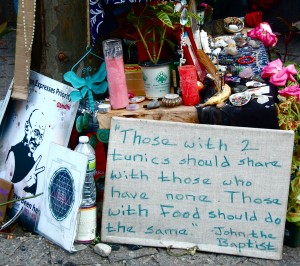 One of the constant threads in scripture is, "Give us this day our daily bread." Nothing more, nothing less. Underneath this admonition is the assumption that the more we store up for tomorrow the less people will have for today. And in a world where 1 percent of the world owns half the world's stuff, we are beginning to realize that there is enough for everyone's need, but there is not enough for everyone's greed. Lots of folks are beginning to say, "Maybe God has a different dream for the world than the Wall Street dream."
One of the constant threads in scripture is, "Give us this day our daily bread." Nothing more, nothing less. Underneath this admonition is the assumption that the more we store up for tomorrow the less people will have for today. And in a world where 1 percent of the world owns half the world's stuff, we are beginning to realize that there is enough for everyone's need, but there is not enough for everyone's greed. Lots of folks are beginning to say, "Maybe God has a different dream for the world than the Wall Street dream."
Maybe God's dream is for us to live simply so that others may simply live. Maybe God's dream is for the bankers to empty their banks and barns so folks have enough food for today.
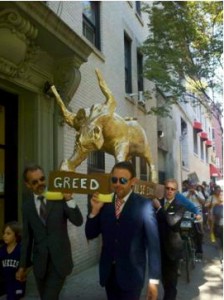 Editor’s Note: In light of the recent protests at #OccupyWallStreet and around the world, we have revisited Jim Wallis’ 2010 book Rediscovering Values: On Wall Street, Main Street, and Your Street and picked out some passages that are particularly pertinent to what we are seeing in our nation today.
Editor’s Note: In light of the recent protests at #OccupyWallStreet and around the world, we have revisited Jim Wallis’ 2010 book Rediscovering Values: On Wall Street, Main Street, and Your Street and picked out some passages that are particularly pertinent to what we are seeing in our nation today.
The Passover of the Jews was near, and Jesus went up to Jerusalem. In the temple he found people selling cattle, sheep, and doves, and the money changers seated at their tables. Making a whip of cords, he drove all of them out of the temple, both the sheep and the cattle. He also poured out the coins of the money changers and overturned their tables. He told those who were selling the doves, “Take these things out of here! Stop making my Father’s house a marketplace!” His disciples remembered that it was written, “Zeal for your house will consume me.”
– John 2:13-17
Interestingly, in his turning over of tables, Jesus specifically targeted the merchants who were selling doves. Doves were the least expensive sacrifice permitted to be offered in the temple, and, therefore, were often bought by the poorest of the pilgrims.
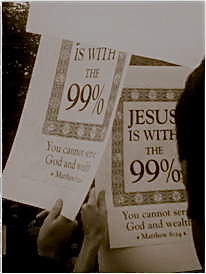
[When Jesus turns over the tables] we see a man enraged at injustice and passionately confronting those who exploit the poor. We also learn that there are some things that we all should get angry about, that there are situations where the only appropriate response is confrontation…
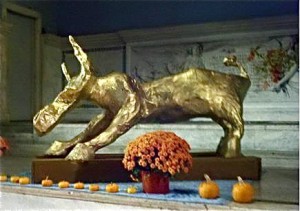 First, we were sold a lie. We were sold an illusion that promised the American Dream was as close as our next purchase. That we could pursue our selfish interests without thought to the consequences, because the “invisible hand” would work it all out in the end. We were told that we did not need to work for wealth, that it would come if only we put our money in the hands of the right stock broker, mutual fund, or stock…
First, we were sold a lie. We were sold an illusion that promised the American Dream was as close as our next purchase. That we could pursue our selfish interests without thought to the consequences, because the “invisible hand” would work it all out in the end. We were told that we did not need to work for wealth, that it would come if only we put our money in the hands of the right stock broker, mutual fund, or stock…
Second, the rules of the game failed. It was supposed to be simple. Work hard, get ahead, buy a home, and tuck some money away for the future in a 401(k). If you followed those rules, everything would work in your favor. But good jobs have disappeared, wages have been garnished, and 401(k) savings have disappeared. The rules of the game seem to have worked for those who set the rules, but not for those who played by them.
Third, our good was supposed to trickle down. We were promised that as the rich got richer, the rest of the country would prosper as well. If we handed our finances and ultimately our lives over to those who knew the market the best, it would benefit us all. If we took the virtues of the market and made them the virtues of our lives, we, too, would experience boundless prosperity. Fulfillment would come if we could just trust the market enough to work for us…
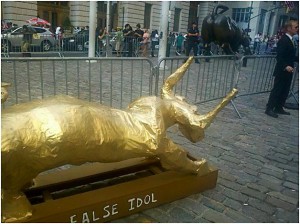 The market has become our “golden calf,” our idol of ultimate allegiance… This is when God—and then Moses—got angry. Why? Just because they built a golden calf? No. The calf could have been just a work of art, a statue to enjoy. What made the calf an idol was that the people gave the newly created calf the credit for leading them out of Egypt. They gave to the golden calf credit and attributes that belong only to God…
The market has become our “golden calf,” our idol of ultimate allegiance… This is when God—and then Moses—got angry. Why? Just because they built a golden calf? No. The calf could have been just a work of art, a statue to enjoy. What made the calf an idol was that the people gave the newly created calf the credit for leading them out of Egypt. They gave to the golden calf credit and attributes that belong only to God…
Today, instead of statues, we have hedge funds, mortgage- backed securities, 401(k)s, and mutual funds. We place blind faith in the hope that the stock indexes will just keep rising and real estate prices keep climbing. Market mechanisms were supposed to distribute risk so well that those who were reckless would never see the consequences of their actions. Trust, security, and hope in the future were all as close to us as the nearest financial planner’s office. Life and the world around us could all be explained with just the right market lens. These idols were supposed to make us happy and secure and provide for all our needs. Those who manage them became the leaders to whom we looked, not just for financial leadership, but direction for our entire lives. That is idolatry.
Rich and poor alike were sucked into making heroes out of those who seemed to be able to turn everything they touched into gold. Holocaust survivor and Nobel Peace Prize recipient Elie Wiesel lost virtually all of his personal wealth and his foundation’s, up to $37 million, to Bernie Madoffs Ponzi scheme. “We gave him everything, we thought he was God, we trusted everything in his hands.”‘
(All pictures are courtesy of Catholics United, who produced the ‘golden calf’. Extracts come from pages 19-29 of the hardcover edition of Rediscovering Values.)
In our own time the "jobs" rhetoric from both the right and the left ignores the power grabs and power differentials that led to the hemorrhaging of American jobs in the first place. The simple truth is that multinational corporations could make more money for their shareholders by outsourcing jobs to third-world countries so that is what they did.
This was not a moral dilemma for CEOs; it was a "sound business decision." And the gospel according to free-market capitalism (the USA's true religion) preaches that what is good for American business is good for America.
 #OccupyWallStreet (the New York-based protest against social and economic inequality, corporate greed, and the influence of corporate money and lobbyists on government) has moved to a new location, a street where the air is far sweeter than on Wall Street.
#OccupyWallStreet (the New York-based protest against social and economic inequality, corporate greed, and the influence of corporate money and lobbyists on government) has moved to a new location, a street where the air is far sweeter than on Wall Street.
Won't you tell me how to get, how to get ... there?
That's right, folks, the occupation has taken over Sesame Street.
This Friday, October 7, 2011, marks 10 years since the United States invaded Afghanistan in the name of the "War on Terror." Sadly, this summer President Obama announced he'll continue our military presence in the country until 2014, and Congress has agreed to follow his lead.
Where do we go from here?
Scripture constantly should be challenging our assumptions about our lives and in every aspect of society. Transformation is needed on a personal and also a political level. Scriptural priorities shouldn't be glossed over in order to protect political ideologies and comfort zones.
If we believe that what Jesus taught remains just as relevant today as it did when he physically walked among us, then it should still be a comfort to those on the margins of society and offensive to the wealthy and powerful. That doesn't mean that the wealthy and powerful can't be good and faithful followers of Christ, but Jesus did warn them that their walk will be a hard one. Wealth and power bring unique and difficult temptations ... If you never feel uncomfortable when you read the Gospels then you aren't paying attention.
About two years ago, Minhee and I made one of the hardest decisions we've made thus far in our marriage and in our calling as parents.
In our hope to honor a conviction of the Holy Spirit to give up a year's salary, we had begun the two-year process of saving, selling, and simplifying in 2007. Our goal was to come up with our then year's wages of $68,000 -- in order to launch One Day's Wages. With only a few months left to come up with the total sum, we were a bit short and decided to sublet our home for couple months and asked some friends if we could stay with them on their couches or their guest room.
Needless to say, it was a very humbling time.
Our instruction for ourselves and our children were very simple: Each person gets one carry-on bag for their belongings.
On Monday the Dow Jones industrial average fell 634.76 points; the sixth-worst point decline for the Dow in the last 112 years and the worst drop since December 2008. Every stock in the Standard and Poor's 500 index declined.
It is easy to blame bipartisan bickering for the impasse that led to Standard and Poor's downgrading of the American debt, and in turn the vertiginous fall of the Dow. This bickering -- this substitution of ideology for reason, of egotism for compassion and responsibility on the part of lawmakers -- is a national disgrace; but while it failed to fix the problem, we must realize that it did not cause it. The cause -- and potential for a significant renewal -- lies much deeper.
So let's allow ourselves to ask a fundamental question: what's an economy for?
"And all ate and were filled; and they took up what was left over of the broken pieces, twelve baskets full. And those who ate were about five thousand men, besides women and children." --Matthew 14:13-21
Immediately before the story of the feeding of the 5,000 is a description of a very different sort of meal: John the Baptizer's head on a platter. And just as women and children are included among the multitude fed on the beach (a detail unique to Matthew's version of the story), the female sex is also represented in the account of John's demise: Herodias, sister-in-law of Herod, asks for the head of the Baptist; her nameless daughter, with no detectable squeamishness, delivers the request to the king and serves up the plated head to her mother. (That women in all of their moral complexity are present throughout Matthew's gospel - recall also the women who appear in the genealogy of Jesus in chapter one -- is an observation worthy of closer scrutiny. See, for instance, Jane Kopas's 1990 essay in Theology Today).
As the time shortens for Congress and President Obama to agree to the contours of legislation to raise the nation's debt ceiling, I am reminded of the story of King Solomon and his judgment regarding two women who both claimed to be the mother of a child (I Kings 3: 16-28). Solomon ordered that the living child be cut in two and half a dead child be given to both women. The woman who was the true mother insisted that the living child be given to the false mother. She was willing to give up her righteous claim to save the child's life.






